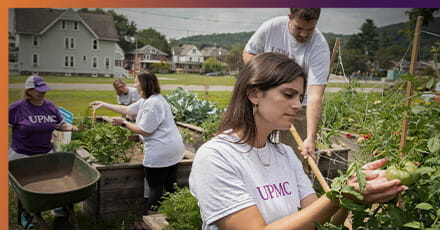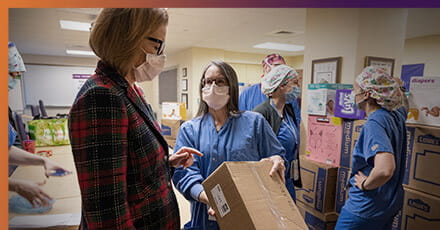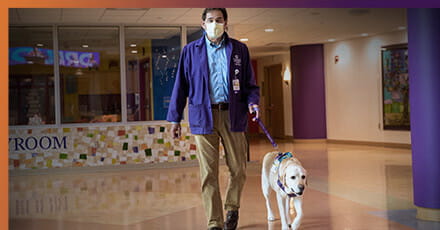As the Women’s Center & Shelter of Greater Pittsburgh marks 50 years, President and CEO Nicole Molinaro is reminded of how far they’ve come.
“We have to remember this was in the early 1970s when domestic violence was not a household term,” Molinaro says of the center’s creation in 1974.
“Now, we understand, 50 years later, and we have understood for quite some time at this point, that it is not just a one-time thing that happens. It's a pattern of power and control that one person uses in a relationship against the other.”
UPMC is a proud partner of the Women's Center & Shelter of Greater Pittsburgh in its mission.
The center’s services for victims of domestic abuse include emergency shelter, support groups, therapy, legal counseling, and more. Molinaro says they continue to evolve services to “meet the growing and changing needs” of domestic violence survivors throughout their journey.
“Most of our survivors receive three or more services, and many of them we are serving for years,” she says. “And that's what we're here for. We're here to help everybody from start to whatever you can consider ‘finish.’ What we consider ‘finishing’ really is the healing from an abusive relationship, and we're here for all of it.”
The center’s evolution in the decades since it opened also extends to technology. In March 2023, it launched the free Bright Sky app. The app provides practical support and information on how to respond to domestic violence.
“After we launched it nationally, we then found ourselves in a position to make sure that folks knew about it,” Molinaro says. “UPMC was one of the first companies to really take that on and help us spread the word that Bright Sky is a resource for anybody experiencing domestic violence and their loved ones.”
Through the Standing Firm program, the center works with companies and organizations to address the impact of domestic violence in the workplace. The national program had its roots in UPMC. It provides training, consulting, and policy development to help employers address domestic violence.
“We know that domestic violence doesn't just stop at the workforce door,” Molinaro says. “We know that when people come to work, if they're experiencing domestic violence or perpetrating domestic violence, it's not something they can just necessarily leave behind.”
Molinaro and the center's nearly 100 staff members have experienced more people seeking help since the start of the COVID-19 pandemic. Molinaro says domestic violence incidents have increased by 8% globally since the onset of the pandemic.
“Unfortunately, it's like opening Pandora's box,” she says. “You can't just put everything back in. Now that the world is increasing in stress— increasing in problems — and now that these issues have really been unleashed in a much different way, it's just not stopping.”
Molinaro says 1 in every 4 women and 1 in every 7 men experience domestic violence. Such numbers emphasize the importance of centers like Women’s Center & Shelter of Greater Pittsburgh in aiding victims of domestic violence. It also shows the work still to be done.
“Unfortunately, we know that for as many people who are reaching out for help, there are so many people who aren't reaching out for help," Molinaro says. "Who might not know that services exist. Who may be scared to reach out for services. Who may not be in a place yet to be able to reach out for help."
Reaching more people also involves overcoming any perceptions of what it means to seek help for domestic violence. Some may interpret help as requiring shelter. However, Molinaro notes only about 4% of the victims that her center helps receive shelter.
“About 400 adults and children every year get served in our shelter, as opposed to an additional 7,100 who are served in all our services combined,” she says.
“But for the majority of people, we can help them with legal advocacy. We can help them with support groups. We can help them with any of our services that can help folks whose situations aren't to the point of needing shelter.”
And, as Molinaro emphasizes, the center is available to help anyone experiencing domestic violence, including male victims.
“We serve anybody here. We serve anyone experiencing domestic violence, regardless of any factor, and that includes gender identification,” she says. “That's really important for folks to know because men can absolutely experience domestic violence and do.”
As the center continues to serve the community, partnerships like the one it has with UPMC are vital to providing help to those in need. “UPMC has been an incredible partner for so much of our existence," Molinaro says. "We really don't know what we would do without UPMC in so many different ways.
“Of course, funding is absolutely needed and so important because we couldn't just exist on the funding that we get from the government. We need funding from corporations, from individuals, from foundations, and UPMC has been an absolute leader in this regard for so many years.”
At UPMC, Life Changing Medicine means supporting survivors throughout their journey with help and hope.
Learn more about how you can help support the Women’s Center and Shelter of Greater Pittsburgh.
Pittsburgh (KDKA): After 50 years of service, Women's Center and Shelter of Greater Pittsburgh continues to help domestic violence victims.
See All That UPMC Does in the Community




















